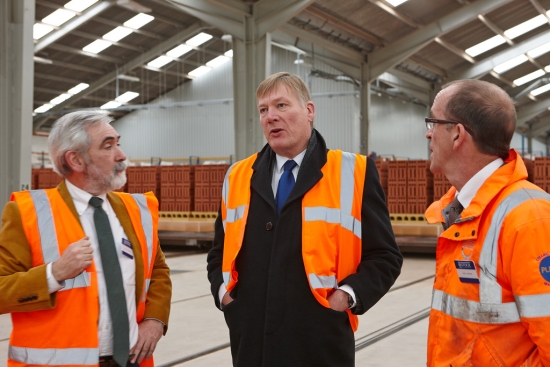The National Audit Office has slammed the decision to scrap regional development agencies (RDAs), claiming the patchwork of replacements have not yet “demonstrated” they are boosting business and creating jobs.

Kris Hopkins MP (centre) visits a brick factory
A study carried out by the watchdog claims the winding up of the RDAs — regional bodies set up by the Labour Government to help employers — and their replacement by a variety of initiatives including new enterprise partnerships and zones, Regional Growth Funds and City Deals is still not delivering value for money. Not surprisingly, the Government says the £3.9bn it will invest in the measures by 2015 are starting to work.
Published the day after the Chancellor’s Autumn Statement, the report warns that central government funding to boost economic growth in regions outside London has fallen dramatically, from £1.4bn in 2010-2011 to just £273m in 2012-2013. The NAO accepts that the funding is due to rise again by 2015 to £1.7bn.
Abolished under a 2010 white paper, the development agencies finally disappeared two years later and, in most regions, were replaced by Local Enterprise Partnerships. These, the report said, were making progress, “though at different rates”. And the expectation of more jobs across the 24 Enterprise Zones had been dramatically downgraded from a 54,000-job forecast by 2015 to between 6,000 and 18,000.
The report found the Regional Growth Funds had had a “slow start”, while the eight City Deals were “at an early stage” but “progressing well in establishing the right structures and processes”.
Nor was it “clear that the Government has achieved its objective to ‘increase democratic accountability and transparency, and ensure that public expenditure is more responsive to the needs of local business and people’ ”.
Commenting on the findings, the head of the NAO Amyas Morse said the new Local Enterprise Partnerships were taking shape, “but the transition from the old to the new schemes has not been orderly and there has been a significant dip in growth spending.”
Measures to bring High Streets back to life and cut youth unemployment levels were all key themes in George Osborne’s Autumn Statement which forecast an economic upturn next year of 2.4 per cent. Part of the job of delivering this falls on local growth minister, Kris Hopkins.
“This Government is taking the difficult decisions needed to tackle the deficit inherited from the previous government and, thanks to our long-term economic plan, we’re now seeing the UK economy growing faster than any of our competitors,” he said.
“We are investing billions through our growth programmes, supporting thousands of local businesses, securing billions in private-sector investment, boosting skills and creating tens of thousands of much-needed local jobs.”
“And we are now reaping the rewards, with the latest GDP figures showing the economy is back on track, with the deficit falling and employment at its lowest for more than three years,” added Hopkins.
Previous Post
North-East Demand on the Rise